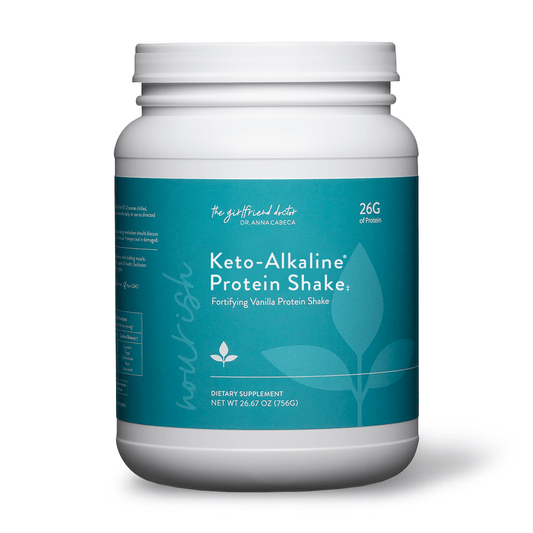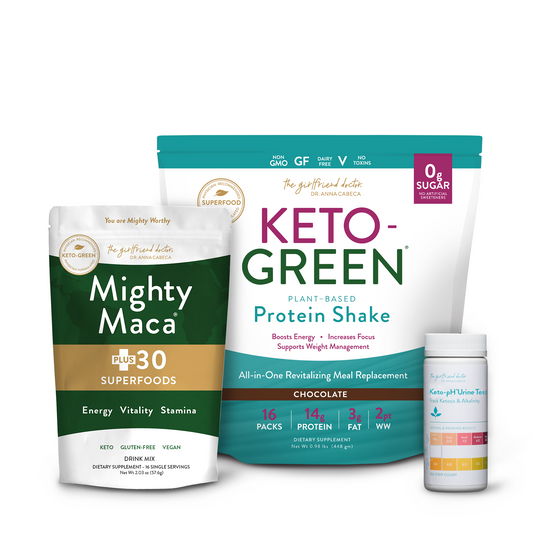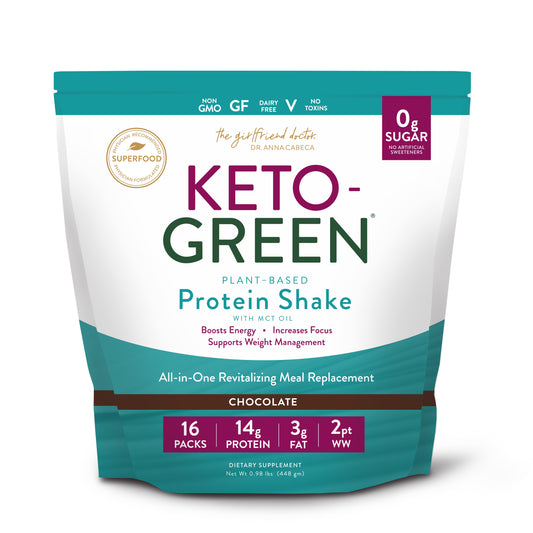Keto constipation is a common digestive issue experienced by many women transitioning to a keto diet to help with menopause symptoms like weight gain, insulin resistance, and hot flashes. Keto constipation is specifically tied to the physiological and dietary shifts of the high-fat, low-carb lifestyle.
If you’re currently in the throes of keto constipation, it can be tempting to give up and start bingeing carbs.
But I’d urge you to stay the course.
Because the ketogenic diet can help:
Restore insulin sensitivity (one of the key factors driving menopause weight gain, high cholesterol, and high blood pressure)
Encourage weight loss (which is also one of the key factors contributing to midlife lifestyle diseases like diabetes and cardiovascular disease)
Support healthy levels of inflammation (one of the major drivers of complications like arthritis, autoimmune disease, and cancer)
Support brain health (because it helps battle brain fog caused by insulin resistance)
Reset your digestion and gut health (because it eliminates gluten, processed carbs, and sugar, all of which destroy your gut)
For many women, it’s one of the best tools for managing menopause and midlife health challenges.
But, if done incorrectly, can cause constipation. Which is no fun. And it’s also horrible for your hormones. You’ve got to eliminate regularly if you want to thrive during menopause.
The good news is that keto constipation is manageable and often temporary.
In this article, you will learn:
Why keto causes constipation and who’s most at risk.
Practical solutions to manage and relieve keto-related constipation.
Prevention strategies for long-term success on the ketogenic diet.
Let’s dive into what causes keto constipation and how to tackle it effectively.

The ketogenic diet drastically reduces carbohydrate intake.
And as a result, most people cut out even low-carb fruits and vegetables.
This change can lead to drastically lowered fiber consumption. And fiber is essential for promoting regular bowel movements.
Additionally, the body’s water and electrolyte balance shifts during the initial phase of keto as glycogen stores are depleted, further contributing to digestive discomfort. Dehydration, coupled with a sudden lack of dietary fiber, can slow intestinal activity and result in “keto constipation.”
Who’s Most at Risk?
Certain groups are more likely to experience constipation when starting keto:
> Beginners: Those new to keto often struggle to adjust their meal plans to include adequate fiber and hydration.
> Low Fiber Consumers: If your pre-keto diet was already low in fiber, the transition might make constipation worse.
> Individuals with Sensitive Digestion: People with existing gut health issues, such as irritable bowel syndrome (IBS), may find their symptoms aggravated.
What Helps Constipation On Keto Diet?
If you’re struggling with keto constipation, the good news is that there are several proven strategies to find relief. By making small adjustments to your diet and lifestyle, you can address the root causes of this issue and reset your digestion — so you can enjoy all the benefits of the keto lifestyle without getting backed up permanently.
Here are some of my top tips, which I’ve learned after being on the ketogenic diet myself for years and from teaching thousands of women how to do keto the right way in my flagship course, Magic Menopause.
Here are some of my top tips, which I’ve learned after being on the ketogenic diet myself for years and from teaching thousands of women how to do keto the right way in my flagship course, Magic Menopause.


Some of my favorites include:
Non-starchy vegetables like spinach, zucchini, cauliflower, and broccoli are rich in fiber and low in carbs, making them some of the best fiber for keto constipation.
Seeds are your friend. Chia seeds and flaxseeds are excellent sources of fiber and can help bulk up stool to get things moving on through.
Avocados are not only high in healthy fats, but they’re also packed with soluble fiber.
Pro tip: aim to gradually add more fiber-rich foods to your meals to avoid overwhelming your digestive system.
To combat this phenomenon:
-
Drink plenty of water throughout the day.
Try incorporating electrolytes like sodium, potassium, and magnesium through foods or supplements to restore balance and improve bowel function.


In addition to supporting sleep and brain health, magnesium acts as a natural stool softener by drawing water into the intestines.
Consider a magnesium supplement if your constipation persists, as it is particularly effective for promoting regularity.


Activities such as walking, yoga, or stretching can encourage bowel movements and improve overall gut health. Plus, exercise helps your brain, heart, and bones. Don’t skimp on exercise during this phase of life, it’s the ultimate low-carb diet constipation cure.
Diversity of gut flora makes a huge difference when it comes to staying regular.
But if you’re trying to restrict carbohydrates in the name of managing your insulin sensitivity — it can be hard to find balance.
And that’s where a meal replacement like my Keto-Green® Protein Shake absolutely shines.
While alkaline protein shakes are hard to find, Keto-Green Protein Shake is formulated with the perfect ratio of fats, protein, and fiber so you know you’re getting everything you need to feed the good gut bugs and keep your digestion on point.
With a wide array of greens powder, vitamins, and minerals it’s the ideal way to fortify your gut while staying in ketosis — without the constipation.
How Long Does Keto Constipation Last?
Keto constipation is usually a temporary issue, but the duration can vary based on individual factors. For most people, this discomfort lasts from a few days to a couple of weeks as the body adjusts to the ketogenic diet.
The Adaptation Phase
During the first 1–2 weeks of keto, the body undergoes significant changes. The shift from burning carbohydrates to burning fat for fuel can temporarily slow digestion, especially if fiber and hydration are neglected. This phase is often when constipation is most likely to occur.
Factors That Influence The Duration Of Keto Constipation
The length of time keto constipation lasts depends on several factors:
- Diet Quality: A well-planned keto diet with adequate vegetables, fiber, and hydration can minimize constipation.
- Hydration Levels: Dehydration tends to worsen constipation; staying well-hydrated can shorten its duration.
- Individual Differences: Some people adapt to keto more quickly than others, meaning their digestive issues may resolve faster.
Tips to Expedite Relief
Gradually introduce fiber-rich, Keto-Green-friendly foods to help your digestive system adjust smoothly.
Stay consistent with your water and electrolyte intake to support regular bowel movements.
Avoid overly restrictive eating patterns that can deprive your body of essential nutrients.
For most individuals, once the body adapts to keto and dietary habits stabilize, constipation should resolve on its own. If symptoms persist beyond a few weeks, it may be worth revisiting your meal plan or consulting a healthcare professional.
Preventing Keto Constipation Long-Term
Preventing keto constipation requires a proactive approach to balancing your diet, hydration, and overall lifestyle, as we’ve explored here.
For many women, when they first start keto, they get excited because they can finally eat the foods we’ve been taught are “no-no foods” for our whole lives. Foods like bacon and butter and full fat dairy.
Which is fun. But, if you want to stave off constipation and really enjoy the benefits of a keto diet for menopausal weight gain, hot flashes, and insulin resistance…you’ve got to also incorporate fiber-rich, keto-friendly foods into your daily meals.
Ideally, you should try to eat tons of alkalizing, lower-carb veggies so you can support both ketosis and proper digestion.
Don’t forget:
-
Load up on non-starchy vegetable options like leafy greens, asparagus, and Brussels sprouts.
Seeds and nuts are your friends. Chia seeds, flaxseeds, and almonds can provide both fiber and healthy fats.
Avocados and coconuts are excellent sources of both fat and dietary fiber.
What Laxative Can I Take On Keto Diet?
Laxatives can be a short-term solution for keto constipation, but they should be used with caution and as a last resort.
There are real risks to laxative use, including:
Dependency: Overusing laxatives can weaken the bowel muscles, leading to chronic constipation.
Electrolyte imbalance: Some laxatives can deplete electrolytes, which is already a concern on keto.
Masking underlying issues: Relying on laxatives might delay addressing the root cause of constipation.
There are much better alternatives to laxatives, as I’ve discussed in this article. Before resorting to laxatives, consider natural remedies such as:
Increasing fiber with chia seeds or flaxseeds.
Drinking more water and adding electrolytes.
Taking magnesium supplements, which could have a mild laxative effect.
Laxatives can be helpful for occasional, short-term relief, but they shouldn’t replace dietary and lifestyle adjustments. If keto constipation persists despite trying natural remedies, consult a healthcare provider to rule out other causes and determine the safest course of action.
Putting An End To Keto Constipation
Keto constipation is a common hurdle for many when transitioning to the ketogenic diet, but it’s one that can be effectively managed and prevented with the right Keto-Green strategy. By understanding its causes, implementing solutions, and adopting long-term strategies, you can maintain healthy digestion and enjoy the benefits of keto without the discomfort.
Here’s a recap of what we covered:
Why keto causes constipation: Reduced fiber and hydration are primary culprits, especially for beginners.
Solutions to manage constipation: Increase fiber intake, stay hydrated, and consider supplements like magnesium, or a meal replacement like my Keto-Green Protein Shake.
Preventing long-term issues: Build a balanced keto meal plan, support gut health, and transition into keto gradually.
If you’re ready to optimize your ketogenic diet further, the next step is to explore my fiber-friendly keto meal plan guide. This will help you structure meals that are not only low-carb but also rich in nutrients to support overall digestive health.














